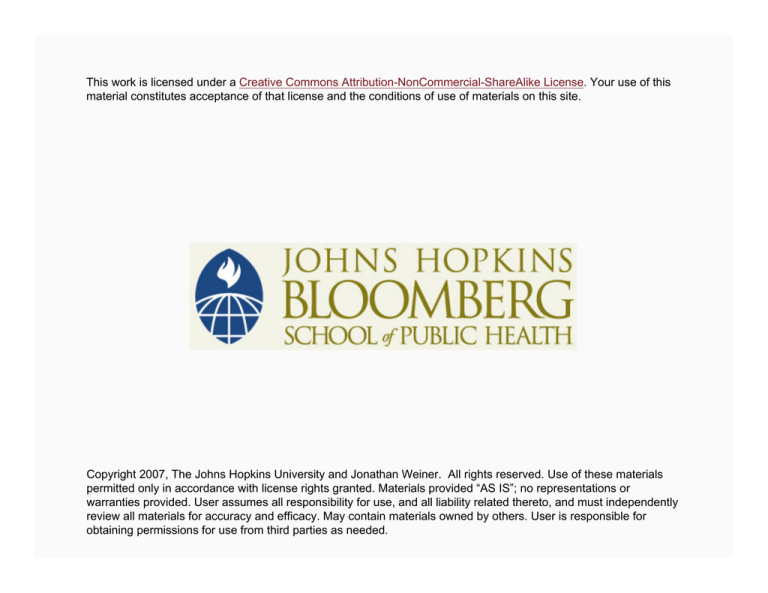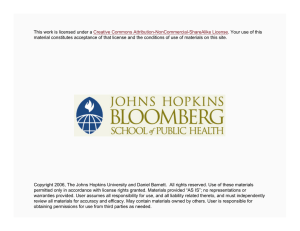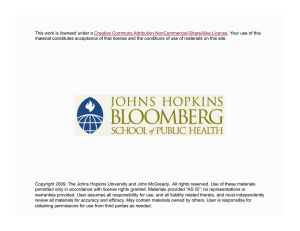
This work is licensed under a Creative Commons Attribution-NonCommercial-ShareAlike License. Your use of this
material constitutes acceptance of that license and the conditions of use of materials on this site.
Copyright 2007, The Johns Hopkins University and Jonathan Weiner. All rights reserved. Use of these materials
permitted only in accordance with license rights granted. Materials provided “AS IS”; no representations or
warranties provided. User assumes all responsibility for use, and all liability related thereto, and must independently
review all materials for accuracy and efficacy. May contain materials owned by others. User is responsible for
obtaining permissions for use from third parties as needed.
Proposal Writing
Lynda Burton, ScD
Johns Hopkins University
Abstracts
What Is an Abstract?
A brief summary (half a page)
Include
− Background
− Objective of research or objectives of program being
evaluated
− Study design
− Methods
3
Specific Aims of Study
Main goal of the program—what does your program intend
to accomplish?
Specific objectives that you will evaluate
Or, what are the major research questions?
What will be gained by the study?
4
Significance of the Study
Justify the relevance of the research to science and/or
Justify the relevance to policy or social welfare, and/or
Why are the questions or issues important to public health?
Where does the study fit in the HSRE framework?
5
Background of the Study (or Literature Review)
What is already known about the issues or this type of
program?
What are the gaps in information?
Describe previous relevant research
How will answering this research question add to the
knowledge base?
How will a positive program evaluation contribute to public
policy?
6
Hypotheses of a Research Proposal
Provide a general focus to approaching the problem
Is generated from the conceptual framework of the study
Expresses some relationship among variables
Is stated in a way that is testable
Usually describes the stated direction of the relationship
7
Hypothesis of a Program Evaluation
The program is effective in that it meets the established
objectives
Normally, in a program evaluation, this hypothesis is not
stated
8
Methods
1.
2.
3.
4.
5.
Research design
Study setting and population
Variables and measures
Sources of data
Timeline
9
Methods: Study Design
Experimental
Quasi-experimental
Observation
Give Campbell and Stanley notation of the design
Describe number of observations
10
Methods: Study Setting
Population to be studied
− Clinic population
− Community-dwelling
− Demographics
Criteria for inclusion in numerator or denominator
Describe sampling frames and possible randomization
11
Methods: Variables and Measures
Independent, dependent, intervening
Constructs, definitions, and instruments to derive measures
Theoretical model describing relationship of variables
12
Methods: Sources of Data
Primary or secondary data? (or combination?)
What data will be used to derive each variable?
How will data be collected? (interview, mail-in survey?
medical record abstracting?)
Identify survey instrument to be used
13
Methods: Analytic Approach
What will you do with the data you collect?
Make comparisons with chi square or t-tests
Plan to carry out multivariate analysis
What analysis will be used to assess reliability and validity of
measures?
Power calculations to determine sample size
14
Methods: Timelines
Develop task list
Lay out tasks along time continuum
Develop milestones or deliverables
Describe who will perform which tasks
Organizational chart (if large study team)
15
Methods: Ethical Considerations
Informed Consent
What is the purpose of the study?
Why was subject chosen for the study?
What are the potential risks and benefits?
Present health care will not be jeopardized by refusing to
participate
Can withdraw at any time
16
Methods: Other Considerations
Logistics
− Qualifications of the research team
− Organizational resources
Budget and other resource requirements
− Personnel
− Supplies, equipment
− Computer time
− Travel
17
Methods: Limitations of Study
Consider all Campbell and Stanley threats to internal validity
Consider all threats to external validity
What are the limitations related to measures?
What are the limitations due to populations?
18
Summary
Overview of study
Highlight methodological uniqueness if any
Why should this study be done? What will it add to science?
What will it provide to the agency paying for the study?
Highlight why the proposed research team is the right one to
do this project
19


